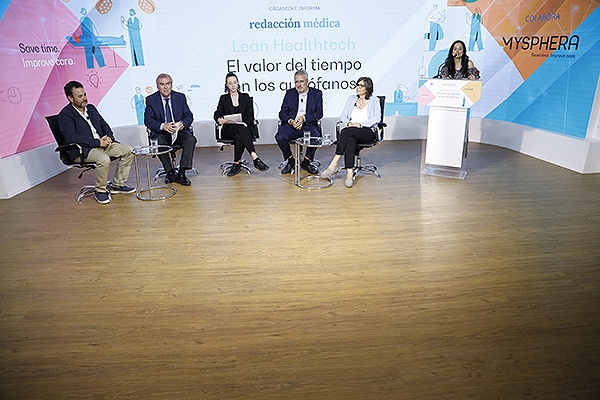
During the conference ‘Lean Healthcare: the value of time in operating theatres’, organized in collaboration with Redacción Médica on Tuesday 14 June, two round tables were held:
- The challenge of reducing waiting lists
- Value-based public procurement
This first round table, moderated by Andrea Pérez López, editor of the Companies Section of Redacción Médica, featured our CEO, Salvador Vera, Vicente Alonso Núñez, Director General of Healthcare of the Extremadura Health Service; Anna Ochoa de Echagüen Aguilar, strategic healthcare consultant at ESSENTIA Health Management; and Francisco Javier Turumbay Ranz, Deputy Director of Information Systems and Health Technologies of the Navarra Health Service.
Four experts in different healthcare areas analyzed different formulas for improvement, emphasizing innovative solutions such as the transformation of time management in operating theatres to make it more efficient and an organizational change in the hospital subject to the efficient incorporation of healthcare technology.
A smart purchase of technology would allow, according to Alonso, “to establish new regulatory measures and laws of response to patients, achieving a permanent knowledge of waiting lists. In Extremadura we have started the third operational plan on waiting lists, carrying out different actions from those we had previously. We need targeted measures focused on efficiency, and that is why we are developing a program in the five common specialties of Extremadura’s hospitals”.
According to Francisco Javier Turumbay, deputy director of Information Systems and Health Technologies at the Navarra Health Service, the outbreak of the pandemic has meant “that professionals are able to innovate as they go along. The stimulus of the coronavirus was so powerful that they were able to work on processes that would not have advanced so quickly without the pandemic”. Transforming the way time is managed in operating theatres is, according to Turumbay, a “terrible challenge ahead. We have to look for those triggers that make us transform the way we manage. We forget that we don’t have data on what people really need. We have to define the data to make decisions. The technologies will be in the hands of the professionals, but we need to invest in them.

During the presentation of the first panel discussion of the healthcare conference on the set of Redacción Médica.
Technology, “useless” without organisational change
Technology has become a key element in the Spanish healthcare system, and Ochoa is convinced that “investment is beginning to be made in this area. However, if it does not go hand in hand with organisational change, technology will be useless. We are starting a cultural change in Spain, supported by a large number of initiatives. The new generations of professionals are maintaining a much more managerial profile, and we have to take advantage of this”.
The coronavirus has dealt a hard blow to Spanish healthcare, although, according to Vera, “it has awakened in some ways the need for change in various perspectives, as well as being accompanied by recovery plans. We are talking about cuts in investment, but there are a number of funds that can bring about a transformation. It would be a pity if we were to make a mistake in the application of these funds. We have identified needs and we have the money to invest in transformation.







